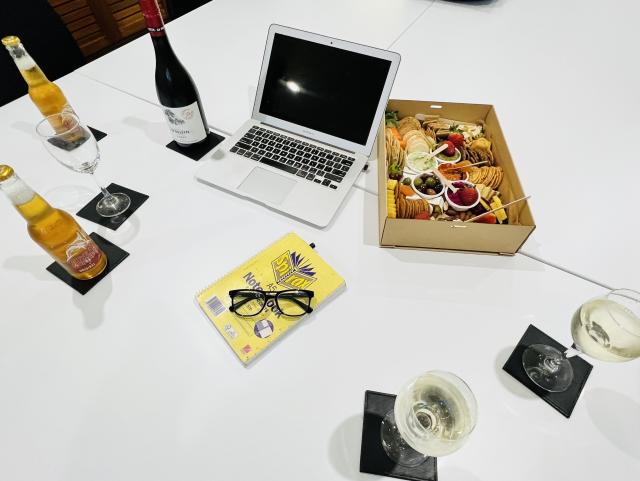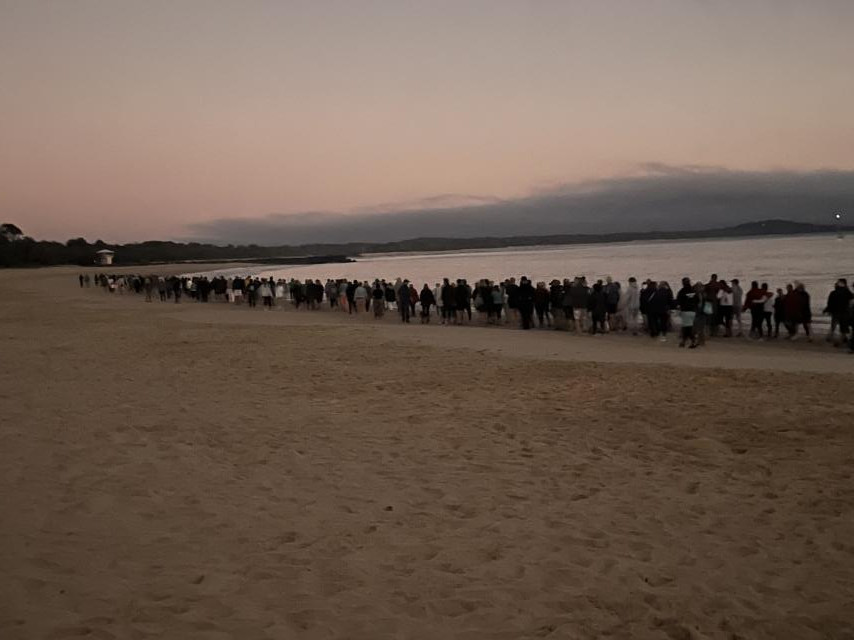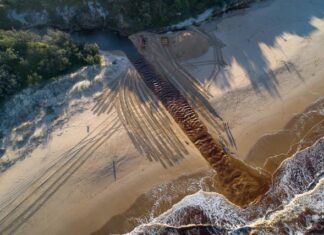Inspired by Treasurer Jim Chalmers’ Wellbeing Budget, the Pub Test borrowed half a dozen key indicators and applied them to life in our shire, with testers giving a score out of 10 pre and post Covid. PHIL JARRATT herded the cats.
1. Satisfaction. Is life better or worse since Covid?
First lady: The conversations I have always relate to how we’re faring in comparison with everywhere else. In general I think we’re really lucky to live where we live. And people were so busy here over Covid, which is quite different from most places. From an economic point of view it was hectic, and everyone is quite relieved that things are starting to quieten down, in terms of the life/work balance. (8.5/9)
First bloke: I think there’s a strong sense that if you live in Noosa you’ve won the lottery. It’s one of the most beautiful places in the world. Covid gave us time to reflect on what’s really important in life, things like family, health and relationships with friends. The things that give you joy. But of course the downside is that the influx of people we’ve seen over this period has shrunk the rental pool and it’s very difficult for people to find housing if you’re on a low to moderate income. We’ve got homeless people living in tents in the Woods already, and Noosa is coming closer to being a two-tiered society. (7.5/9.5)
Second bloke: I’ll speak for my generation, 40 and below, which is not the big demographic in Noosa but it’s possibly the one suffering the most from things like mortgage stress. In a way, we’re all paying back whatever stimulus packages we got during Covid with interest. You can see on social media that there’s a degree of hopelessness unless you’re fortunate enough to have access to the bank of mum and dad. Basically it’s young people coming to terms with the fact that at a certain point they’re going to have to move on from Noosa. I think that adds up to the under 40s carrying a big weight on their shoulders. I’m always happy, but I see a lot of people who aren’t because they don’t see a future in Noosa. So it’s 9.9 for me but for my cohort about half that. (6/4)
Third bloke: I think there’s more opportunity for young people now than there was. I base that on my observations that we’re all getting old and when a partner has to go into care, you lose your house, in many cases. So I’m somewhat skeptical that the housing shortage is going to be a long-term problem. I think it’s a bubble, and at the same time there is so much opportunity for entrepreneurs here, particularly young ones. The town is full of people who just got here, and they seem to have a lot of money. (9.5/10)
Second lady: I see my satisfaction reading as being in line with who’s in the federal government, because I’m a political animal and with the previous government I was ashamed of our country and very worried about a lot of big picture stuff. Translating that to Noosa, when I was a kid there was this joke line, how do you make a small fortune in Noosa? Arrive with a big one. That was 40 years ago and there was the same divide then, because we didn’t like all these people from Melbourne coming here with heaps of money and building on the Sound and taking over. We loved it when they started the wrong kind of business and went bust! (6/9)
2. Health. Is our healthcare adequate, particularly for our ageing demographic?
First lady: I think it is. In fact I think for the ageing people I know, it’s quite amazing. Everything they need is right here, or worst case 40 minutes away. Looking at the bigger picture, I think we’re extremely lucky, and have been for some time. (9/9)
First bloke: I hear good stories about access to the health system when they need it but post-Covid not so much. I don’t know why but people seem to struggle now to get into the health services they need. Aged care facilities struggle to get staff, but that’s nationwide. (7.5/7)
Second bloke: 15 years ago there was a debate about is Noosa Hospital big enough? Is the emergency room adequate? I think that’s waned now that we have SCU (Sunshine Coast University Hospital) on line about the same distance away as Nambour Hospital but with far superior facilities. From the perspective of a younger person with a growing family, this is the best place in the world to get sick in! (9/9)
Second lady: What I fear for the younger generation including my kids is that without reform the free health care system that we’re so proud of will not be sustainable. It already has massive cracks and no one is doing anything. Medicare is the envy of the world but if we’re not careful we won’t have it, unless there’s a huge injection of government investment. I hear that even at SCU there are growing administrative problems and waiting times are blowing out. Also, pre-Covid and during it an aged pensioner never had to pay to see a doctor. Now they have to pay $65 upfront and get $43 back. An alarming number of people like that won’t pay it on principle, or they won’t go to the doctor. That’s what I mean by the cracks. (8/5)
3. Safety. Do we still feel safe in Noosa and is our policing good enough?
First lady: I think it’s becoming a major issue for our youth particularly. A lot of it goes unreported or nothing is done about it. We’re definitely under-policed and often you simply can’t get a response from them. We were seen as one of the safest destinations in the country and now that’s at risk. I’m not basing that on what the media has reported, but on what I hear about people walking home at different times of day and night after work and being harassed and even threatened. (9.5/6)
First bloke: I think this is another two-speed situation. Prior to Covid and going back 30 years, we always had neighbourhood watches, right through the Eastern Beaches because break-ins and thefts were a big problem, but that all melted away as neighbourhoods changed. At one point I had disturbed neighbours who would hurl eggs at me and slash my car tyres but that stopped for me and I guess for a lot of people because the watches stopped. Noosa became a safer place, and I think that’s still true of most neighbourhoods, but as far as the tourist precincts are concerned, it’s less safe. But I feel safe in Noosa, and I think you can see that a lot of people feel that way, and when an incident happens, like an elderly man is murdered on his morning walk, they march on the beach in protest. (8/8).
Second bloke: Well, we don’t have locks on our doors, we know all our neighbours and our kids feel safe in walking the streets. But I was affected by that tragedy like most people. Unfortunately mental illness plays a part in this, as it has for decades, so perhaps it goes back to healthcare, identifying problems before they happen. And that means paying people more to work in that sector. When we talk about policing, do you really think the funding should be increased here at the expense of Logan or Ipswich? (9/9)
Third bloke: I think Noosa is still safe but in some areas there seems to be a heightened anxiety amongst people. I’ve heard recently of a council staff person addressing a meeting at Cooroy alone and she was verbally attacked to the point where she felt threatened. And people enforcing the local laws have suffered the same kind of treatment. It seems like the trolling culture of social media is seeping onto the streets. (10/8)
4. Prosperity. As a community are we more or less prosperous?
First lady: My gut feeling is that we’re more prosperous. I’m aware that there’s an underside, but compared with other parts of SEQ, we’re doing very well. Noosa was only locked down for a two-month period and then a couple of weeks over nearly three years, so no one was damaged financially too badly. With the stimulus, even the lower-paid workers earned more than they did prior to Covid. (9/10)
First bloke: Noosa’s median wage has always been well below the Queensland average, but there are a lot of people here who have significant amounts of money, Fortune 500 CEOs and the like. And then there are people doing three jobs to make ends meet. I just feel fortunate that we got into the housing market, albeit in a modest shack, many years ago when we could. We could never afford to now. (7/7)
Second bloke: There are more prosperous people here now than there were pre-Covid but there are also more people just surviving, or working three jobs to pay their bills. It’s all relative. Decades ago when the campground was still in the Woods you had people on the poverty line living the dream at the same time!
Third bloke: As I mentioned before, I just see so much opportunity in Noosa, situations where you could make a lot of money very quickly by working several menial jobs and camping out or sleeping in your car to save on expense. (9/9)
First lady: Well, we have hundreds of Brazilians here doing just that, and the hospitality industry wouldn’t be surviving without them.
Second lady: Post-Covid it’s ridiculous how much money some people have, and in Noosa some of those people seem to be able to pull the strings so that they have the people we’ve been talking about working for them for very little. It makes me feel like I live in Columbia! (10/11)
5. Sustainability. How are we doing?
First lady: Compared with other places I think we’re doing very well, but we’ve slipped back somewhat. When I first moved to Noosa, the projections for the green economy were amazing, but unfortunately that all took a dive during the Sunshine Coast Council era. Since 2014 it’s been a struggle to get it back up there in areas like waste management. Places like Rockhampton and Bundaberg that had no programs in place a few years ago are now gaining massive ground on us. (9/7)
First bloke: We’re way behind in terms of public attitudes to waste management. People say we should take more personal responsibility for our rubbish and then call for a kerbside collection so you can dump your stuff on the footpath. Our diversion rates are good but the problem is we’re generating more and more waste.
Second lady: How does this guy in a pub know all this? (Laughter)
First bloke: We need some mandatory changes at federal level on plastic packaging and single use plastic bottles. In emissions I think we’ve done better and we’ve set our target, but we’re going to have to work very hard to get there. (9/7)
Second bloke: I agree on mandates. We’ve got to get people behind a war on waste. (7/7)
Third bloke: I think there’s hope moving forward. (8/9)
Second lady: It has to be regulated from the top down. I get so mad about food packaging. (7/7)
6. Tolerance. Are we a more tolerant society since Covid?
Second lady: We don’t have any diversity and we’re not tolerant of anything at all. (Laughter)
First lady: I hope we are when the referendum comes around. I feel that in general Noosa is a tolerant society. (9/9)
First bloke: Generally speaking happy people are tolerant people, but post-Covid, post-Trump, that’s all changed. We’re more divided and entrenched in our views. As the referendum approaches we’re going to hear a lot of hate speech. There’s an ugly underbelly that you see on social media. (8/8)
Second bloke: We don’t have mosques on our doorstep and we don’t see too many cross-gender people on the streets so it’s hard to know. On the Indigenous side I think we’ve improved markedly. (6/8).
Third bloke: I don’t see intolerance here. (9.5/9.5)
Second lady: I think people want to be seen as tolerant but aren’t really. (5/5)









